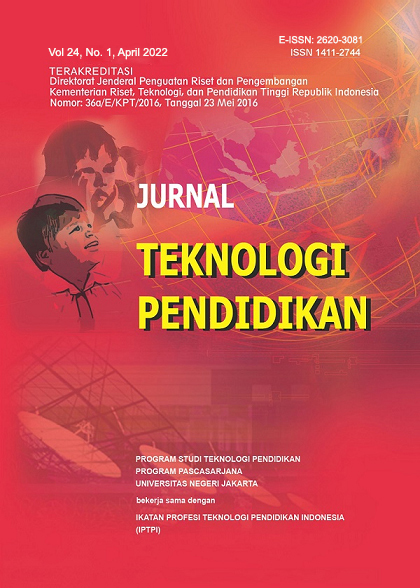Analysis of Android-Based Educational Game Media Development Needs for Social Studies Learning in Elementary Schools
DOI:
https://doi.org/10.21009/jtp.v24i1.22552Keywords:
needs analysis, educational games, surveyAbstract
This study aims to find out information about the need for educational games, perceptions of educational games, and educational game design according to teachers and students. The method used in this research is a survey to find out the initial data which is the process of developing educational game products. The instrument used is a questionnaire sheet and an interview sheet. The data analysis technique used quantitative and qualitative descriptive statistical analysis techniques. The schools that were used as research samples were 3 schools spread across Magelang Regency. Each school selected 2 class teachers. The results showed that teachers and students at SD Magelang Regency had a good perception of educational games. The need for educational games according to the teacher is a game that contains evaluation questions and the type of game that students need is an adventure genre game. The design of educational games developed according to the teacher must pay attention to aspects of appearance, content, and affordability of the game. Meanwhile, according to students, educational games are games that are interesting and have challenges or missions that must be completed.
References
Aslan, S., & Balci, O. (2015). GAMED: Digital educational game development methodology. Simulations, 91(4), 307–319. https://doi.org/10.1177/0037549715572673
Cahyana, U., Paristiowati, M., Nurhadi, MF, & Hasyrin, SN (2017). Study on Students' Learning Motivation on the Use of Mobile Game Base Learning Media in Chemical Reaction Rate Learning. JTP-Journal of Educational Technology, 19(2), 143–155.
Chang, SC, & Hwang, GJ (2017). Development of an effective educational computer game based on a mission synchronization-based peer-assistance approach. Interactive Learning Environments, 25(5), 667–681. https://doi.org/10.1080/10494820.2016.1172241
Chen, SW, Yang, CH, Huang, KS, & Fu, SL (2019). Digital games for learning energy conservation: A study of impacts on motivation, attention, and learning outcomes. Innovations in Education and Teaching International, 56(1), 66–76. https://doi.org/10.1080/14703297.2017.1348960
Dimitriadou, A., Djafarova, N., Turetken, O., Verkuyl, M., & Ferworn, A. (2021). Challenges in Serious Game Design and Development: Educators' Experiences. Simulation and Gaming, 52(2), 132–152. https://doi.org/10.1177/1046878120944197
Elsherbiny, MMK, & Raya, RH (2021). Game-based learning through mobile phone apps: effectively enhancing learning for social work students. Social Work Education, 40(3), 315–332. https://doi.org/10.1080/02615479.2020.1737665
Erhel, S., & Jamet, E. (2016). The effects of goal-oriented instructions in digital game-based learning. Interactive Learning Environments, 24(8), 1744–1757. https://doi.org/10.1080/10494820.2015.1041409
Havukainen, M., Laine, TH, Martikainen, T., & Sutinen, E. (2020). A Case Study on Co-designing Digital Games with Older Adults and Children: Game Elements, Assets, and Challenges. The Computer Games Journal, 9(2), 163–188. https://doi.org/10.1007/s40869-020-00100-w
Herliandry, LD, Nurhasanah, N., Suban, ME, & Kuswanto, H. (2020). Lessons Learned During the Covid-19 Pandemic JTP - Journal of Educational Technology, 22(1), 65–70. https://doi.org/10.21009/jtp.v22i1.15286
Hwang, GJ, & Chang, CY (2020). Facilitating decision-making performances in nursing treatments: a contextual digital game-based flipped learning approach. Interactive Learning Environments, 0(0), 1–16. https://doi.org/10.1080/10494820.2020.1765391
Iacovides, I., Aczel, J., Scanlon, E., Taylor, J., & Woods, W. (2011). Motivation, engagement and learning through digital games. International Journal of Virtual and Personal Learning Environments, 2(2), 1–16. https://doi.org/10.4018/jvple.2011040101
Jo, J., Yu, W., Koh, KH, & Lim, H. (2018). Development of a Game-Based Learning Judgment System for Online Education Environments Based on Video Lecture: Minimum Learning Judgment System. Journal of Educational Computing Research, 56(6), 802–825. https://doi.org/10.1177/0735633117734122
Kavanagh, W., & Miller, A. (2021). Gameplay Analysis of Multiplayer Games with Verified Action-Costs. The Computer Games Journal, 10(1–4), 89–110. https://doi.org/10.1007/s40869-020-00121-5
Learning, DG (2001). The Digital Game-Based Learning Revolution. Learning, 1(1), 1–19. https://doi.org/10.1016/j.iheduc.2004.12.001
Okada, Y., & Matsuda, T. (2019). Development of a Social Skills Education Game for Elementary School Students. Simulation and Gaming, 50(5), 598–620. https://doi.org/10.1177/1046878119880228
Prasetya, DD (2014). Multiplatform Mobile Game Application For Learning. May 2014. https://www.researchgate.net/publication/325273576_APLIKASI_GAME_MOBILE_MULTIPLATFORM_UNTUK_PEMBELAJARAN
Putri, RE (2021). An analysis of Instructional Media for English Teachers During The Pandemic (case study SMA Bukit Raya). 23(2), 95–100.
Rakasiwi, CW, & Muhtadi, A. (2021). Developing Educational Games for Mathematics Learning to Improve Learning Motivation and Outcomes. 23(April), 49–57.
Rusmono, & Alghazali, MI (2019). The Effect of Picture Story Media and Reading Literacy on Learning Outcomes of Elementary School Students. JTP - Journal of Educational Technology, 21(3), 269–282. https://doi.org/10.21009/jtp.v21i3.13386
Sulistiyarini, D., Ramadhani, D., & Sabirin, F. (2021). Developing Serious Video Games for Data Communication Courses. Journal of Educational Technology, 23(April), 11–22.
Supriadi, M., & Hignasari, LV (2019). Development of Virtual Reality Media on Content for Science Lessons for Class VI Elementary School. JTP - Journal of Educational Technology, 21(3), 241–255. https://doi.org/10.21009/jtp.v21i3.13025
Wahyuni, DR, Aulia, V., & Boer, RF (2021). Instructional Communication Process in Online Learning ( School From Home ) during Covid-19 Pandemic. 21(2), 81–94.
Young, MF, Slota, S., Cutter, AB, Jalette, G., Mullin, G., Lai, B., Simeoni, Z., Tran, M., & Yukhymenko, M. (2012). Our princess is in another castle: A review of trends in serious gaming for education. Review of Educational Research, 82(1), 61–89. https://doi.org/10.3102/0034654312436980
Downloads
Published
How to Cite
Issue
Section
License
Jurnal Teknologi Pendidikan is an Open Access Journal. The authors who publish the manuscript in Jurnal Teknologi Pendidikan agree to the following terms.
Attribution-ShareAlike 4.0 International (CC BY-SA 4.0)
-
Attribution — You must give appropriate credit, provide a link to the license, and indicate if changes were made. You may do so in any reasonable manner, but not in any way that suggests the licensor endorses you or your use.
-
ShareAlike — If you remix, transform, or build upon the material, you must distribute your contributions under the same license as the original.
- No additional restrictions — You may not apply legal terms or technological measures that legally restrict others from doing anything the license permits.
Notices:
- You do not have to comply with the license for elements of the material in the public domain or where your use is permitted by an applicable exception or limitation.
- No warranties are given. The license may not give you all of the permissions necessary for your intended use. For example, other rights such as publicity, privacy, or moral rights may limit how you use the material.








